Back to Journals » Patient Preference and Adherence » Volume 16
Beliefs and Barriers to COVID-19 Vaccine Acceptance in Three Countries with Different Human Development Index (HDI) Scores: A Comparative Study
Authors Makki S , Siddiqua A , Wahab S, Siddiqui S, Faheemuddin M, Abobaker I, Abdelmoniem A, Khaled A
Received 18 October 2022
Accepted for publication 3 December 2022
Published 13 December 2022 Volume 2022:16 Pages 3257—3265
DOI https://doi.org/10.2147/PPA.S393956
Checked for plagiarism Yes
Review by Single anonymous peer review
Peer reviewer comments 2
Editor who approved publication: Dr Johnny Chen
Soha Makki,1 Ayesha Siddiqua,1 Shadma Wahab,2 Sazada Siddiqui,3 Md Faheemuddin,4 Israa Abobaker,5 Alaa Abdelmoniem,6 Arwa Khaled1,7
1Department of Clinical Pharmacy, King Khalid University, Abha, Kingdom of Saudi Arabia; 2Department of Pharmacognosy, King Khalid University, Abha, Kingdom of Saudi Arabia; 3Department of Biology, King Khalid University, Abha, Kingdom of Saudi Arabia; 4Department of Pharmacology, Vishnu Institute of Pharmaceutical Education and Research, Narsapur, Telangana, India; 5Department of Statistics, University of Khartoum, Khartoum, Sudan; 6Department of Clinical Pharmacy, Faculty of Pharmacy, University of Medical Sciences and Technology, Khartoum, Sudan; 7Department of Clinical Pharmacy, Beni-Suef University Hospital, Beni-Suef University, Beni-Suef, Egypt
Correspondence: Ayesha Siddiqua, Department of Clinical Pharmacy, King Khalid University, Abha, Kingdom of Saudi Arabia, Email [email protected]
Background: As vaccination is a cornerstone strategy to prevent the spread of COVID-19, this study assessed and compared beliefs about and barriers to COVID-19 vaccination among the population of three countries with different Human Development Index (HDI) scores: Saudi Arabia (very high), India (medium), and Sudan (low).
Methods: A web-based, self-administered structured questionnaire was employed to collect data from the three countries. The questionnaire contained three sections that measured sociodemographic characteristics, participants’ beliefs about and attitudes toward COVID-19 vaccines, barriers to receiving COVID-19 vaccines, and scenarios in which there is a possibility to take a COVID-19 vaccine. Multinomial logistic regression was used to determine whether there was an association between the country of the participant and their beliefs about COVID-19 vaccines.
Results: 972 responses were collected. The study participants from India were more likely to believe in the safety and efficacy of vaccines than those from Saudi Arabia or Sudan. Consequently, they reported more willingness to get vaccinated to avoid complications from COVID-19. Regarding barriers to COVID-19 vaccination, concerns about adverse effects and ineffectiveness of vaccines were more common among Saudi participants, while concerns about conspiracy were more common among Sudanese participants.
Conclusion: COVID-19 vaccine acceptance was higher in countries with a very high to medium Human Development Index, indicating greater belief in the safety and efficacy of COVID-19 vaccines.
Keywords: COVID-19 vaccination, human development index, beliefs, barriers
Introduction
Every aspect of life has been adversely affected by the current recession brought on by the coronavirus pandemic. In order to stop coronavirus infections and further devastation from the pandemic, vaccines have been developed. The World Health Organization (WHO) has already approved many vaccines, and vaccination campaigns have already begun in several countries. Although there is much evidence that vaccines are safe and help to improve health outcomes, there is still a lack of acceptance of vaccines among some people. The general public’s reluctance to receive a COVID-19 vaccine is frequently attributed to apprehension about side effects, vaccine safety, and vaccine efficacy.1,2
Low acceptance rates for COVID-19 vaccines are also related to inadequate information, vaccine distrust, and uncertain or fleeting immunity. Another factor cited by Lin et al is the accelerated development of vaccines, which contributed to mistrust and doubt about the vaccine development process, clinical trials, and authorization, as well as increased vaccine safety concerns.3 Additional factors contributing to increased distrust and opposition to vaccination include conspiracy theories and a lack of faith in authorities and healthcare professionals.
There have been numerous studies on vaccine acceptance and hesitation. In most international studies, the general public’s acceptance rate was lower than that of healthcare professionals. The main justifications for lack of acceptance of vaccines were concern about potential side effects and the fast development of COVID-19 vaccines.4 A cross-sectional online survey5 was conducted in Greece and found that the probability of receiving a COVID-19 vaccine was associated with knowledge of Greek public health authorities and an absence of vaccine safety concerns. In contrast, some surveys6–9 on acceptance of and hesitation about the COVID-19 vaccines in Japan have found that between 50% and 70% of the population support the vaccines.
Vaccine acceptance is also affected by a country’s development index. A country’s average performance in three fundamental areas of human development (health, knowledge, and standard of living) is summarized and combined in the Human Development Index (HDI). The HDI compares and ranks nations based on expected educational attainment and average annual income.10,11 According to recent research, which was published on July 16, 2021, in Nature Medicine, respondents’ willingness to receive a COVID-19 vaccine was significantly greater in developing nations (80% of respondents) than in the US (65%) and Russia (30%). In low- and middle-income countries, respondents cited personal protection against COVID-19 as the primary reason for vaccine acceptance (91%), while worry about side effects was cited as the main deterrent to vaccination (44%).11 There is evidence that delays in vaccine rollout exacerbate inequality both within and between countries, with estimates stating that an additional 150 million people have already been pushed into extreme poverty as a result of COVID-19.12 In addition to income and information sources, the availability of knowledge also affects vaccine acceptance. The most reliable sources of information about COVID-19 vaccines are thought to be medical professionals. The researchers, who conducted the surveys in 2020–21, found that vaccine acceptance may vary over time according to what information the general public is exposed to at a particular moment.13,14 Many studies have investigated COVID-19 vaccine acceptance in individual countries, but to our knowledge no study has compared vaccine acceptance among the general population of countries based on their HDI score. Therefore, this study aimed to compare beliefs about and barriers to COVID-19 vaccine acceptance in countries with varied HDI scores.
Methodology
Study Design, Study Population, and Study Setting
We conducted a cross-sectional study on the general public of India, Sudan, and Saudi Arabia over 4 months (March-June 2021) using an online questionnaire.
Sample Size and Sampling Criteria
The HDI ranks Saudi Arabia as high, India as medium, and Sudan as low. These countries were chosen to explore how development index could affect vaccine acceptance. Data was collected from 324 participants from each country. Eligible study participants were recruited using the non-probability convenience sampling method. The inclusion criteria were age > 18 years and from India, Saudi Arabia, or Sudan. The exclusion criterion was severe cognitive impairment.
Research Instrument and Data Collection
The research instrument was a web-based, self-administered structured questionnaire. A draft questionnaire was created after a literature search,15–17 using previous studies as a guide, and focus group discussions were held to understand people’s concerns regarding COVID-19 vaccines. This draft questionnaire then underwent face and content validation, and a final questionnaire was prepared to fulfill the objective of this study. To protect the respondents’ anonymity and elicit unbiased comments that more accurately represent their ideas, no identification details were requested from the respondents. The questionnaire was converted into a web-based format (Google Forms) and delivered to the participants in English and Arabic through social networking websites (Facebook, Twitter and WhatsApp). The questionnaire had three sections. The first section of the survey asked seven questions about the participants’ sociodemographic characteristics. The second section contained four questions about participants’ attitudes toward and beliefs about COVID-19 vaccines; these questions were answered with yes, no, or maybe. The third section had two subsections containing seven questions on barriers to getting a COVID-19 vaccine and eight questions on scenarios in which there is a possibility to take a COVID-19 vaccine. For both subsections, the questions were answered with yes or no.
Statistical Analysis
After data collection, responses were downloaded as a Microsoft Excel file and blindly assessed. We used Statistical Package for Social Sciences Version 20 (SPSS Inc, Chicago, IL, USA) to conduct statistical analysis. Descriptive statistics were calculated to express the results as proportions, and the Mann Whitney test was used to determine whether there was a statistically significant relationship between each of the respondents’ sociodemographic characteristics and acceptance of vaccines. A p value of < 0.05 was considered significant.
Ethical Considerations
The research ethics committee at King Khalid University approved this study, approval number ECM#2021-3703. Participants’ consent was obtained through a question on the survey’s first page indicating their voluntary participation.
Result
Baseline Characteristics
We obtained 972 responses from three countries: India, Saudi Arabia (SA), and Sudan. As shown in Table 1, participants aged 18–29 years had the highest response rates in India and SA (73% and 42%, respectively), whereas those aged 30–39 years had a relatively higher response rate than other age groups in Sudan (35%). In all three countries, more females than males participated in the study. Most participants from all three countries had a graduate or postgraduate degree (51% and 40%, respectively). Respondents from Sudan were more likely than those from SA and India to live in urban areas. Most of the respondents in all three countries reported good to excellent overall health.
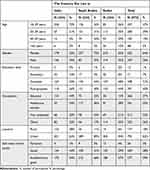 |
Table 1 Baseline Characteristics |
Participant’s Beliefs About and Attitudes Toward COVID-19 Vaccines
A Chi-square test was used to determine whether there was an association between the country of the participant and their beliefs about COVID-19 vaccines. We found statistically significant differences among participants from the three countries in all aspects of their beliefs about vaccines (p <0.005). Participants from India were more likely to believe in the safety and efficacy of vaccines than those from SA or Sudan. Consequently, they reported more willingness to get vaccinated to avoid complications from COVID-19 (Table 2).
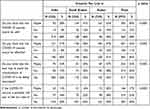 |
Table 2 Participant`s Belief/Attitude Towards the COVID-19 Vaccine |
Barriers to COVID-19 Vaccination
In this part of the study, we investigated factors that were potential barriers to vaccination and possible motivations for vaccination among participants from each of the three countries. Of note, we received responses to this section from only 57 participants from India, 72 participants from SA, and 90 participants from Sudan. Factors with statistically significant differences across the three countries were: concern about adverse effects of the vaccines (p <0.005), concern about the inability of vaccines to stop the spread of COVID-19 (p = 0.038), and concern that vaccines were a conspiracy (p = 0.029). Concerns about adverse effects and ineffectiveness of vaccines were most common among Saudi participants, whereas concerns about conspiracy were most common among Sudanese participants (Table 3).
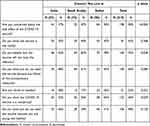 |
Table 3 Barriers Associated with the COVID-19 Vaccine (Reason for Not Taking the Vaccine) |
Factors that encouraged vaccination and had statistically significant differences across the three countries included vaccines being available free of charge, physician recommendation to receive a vaccine, employers or the government mandating vaccination, vaccination of family members or friends, availability of non-injectable vaccines (p <0.005), and the emergence of studies that that confirm the safety and efficacy of vaccines (p = 0.001; Table 4).
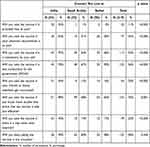 |
Table 4 Scenarios Under Which There is a Possibility to Take the COVID-19 Vaccine |
Factors Associated with COVID-19 Vaccine Rejection
We used a multinomial logistic regression to determine the baseline characteristics associated with accepting or rejecting COVID-19 vaccination. Most baseline characteristics did not show a statistically significant relationship with vaccination status. However, participants from Sudan were more likely to reject or be reluctant about vaccines than Saudi participants (OR for “No” = 1.519, p = 0.035; OR for “Maybe” = 1.684, p = 0.018; Table 5).
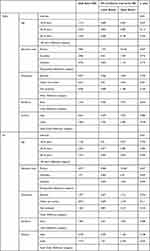 |
Table 5 If the COVID-19 Vaccine is Available, Will You or Did You Take It |
Discussion
Of the 972 respondents obtained during the vaccination era, a majority from India and SA (69% and 62%, respectively) were willing to take a COVID-19 vaccine if it were available. This result is similar to data from the United States of America (US), where 59–75% of US adults indicated a willingness to get vaccinated.18,19 Another study in SA found that 64.7% were willing to get vaccinated.20 While only half of the respondents (50%) from Sudan were willing to take a COVID-19 vaccine if it became available, this finding is close to that of the SA study, which found that 44.7% of respondents were willing to be vaccinated.21 Sudanese respondents’ low willingness to get vaccinated might be because they have the lowest belief in the safety and efficacy of COVID-19 vaccines compared to respondents from India and SA, as evidence showed that beliefs are the most important factor in determining acceptance of the vaccines.22
In contrast to the previously mentioned studies, we found three significant barriers to COVID-19 vaccination. These three barriers were concern about the vaccines’ adverse effects, concern about vaccines’ inability to stop the spread of COVID-19, and concern that vaccines were a conspiracy. Concerns about conspiracy were most common among Sudanese participants. COVID-19 conspiracy theories spread widely and readily over the world through social media. This might be due to the rapid development of COVID-19 vaccines, as the same scenario was observed and reported during the H1N1 pandemic.23–25 Conspiracy theories also emerged as a reason for low vaccine acceptance, as was the case with the H1N1 pandemic.26 A similar report also noted this phenomenon with the influenza vaccine in SA.27 The rapid development of COVID-19 vaccines might also be a reason for the growth of concerns about adverse effects and the vaccines’ inability to stop the spread of COVID-19, which were the most common reasons for vaccine hesitation among Saudi respondents.
Our results showed that vaccines being available free of charge, physicians recommending vaccines, employers or the government mandating vaccination, vaccination of family members or friends, availability of non-injectable vaccines, and the emergence of studies that confirm the safety and efficacy of vaccines were all factors that could encourage COVID-19 vaccination among participants in these three countries. Evidence showed that physician recommendations boost vaccine acceptance.28
Future research should address the following limitations of this study. First, the sample may not be representative of the entire population because the participants were recruited using a convenience sampling technique. Second, in contrast to longitudinal studies, a cross-sectional study design makes it impossible to draw conclusions about causes and effects. It is important to note that, due to social isolation, lockdowns, and the fact that study participants were located in different countries, a longitudinal study design was not a practical option. Thirdly, the study did not include the participants` comorbidities, but this would affect the vaccine acceptance as per the reports of the WHO,29 so a future study emphasizing comorbidities would be worth it. In addition, this study initially intended to collect data from four countries to cover all levels of the HDI: Saudi Arabia (very high), Egypt (high), India (medium), and Sudan (low). However, due to a low number of responses (N = 7) from Egypt, those responses could not be included in the data analysis.
Conclusion
In conclusion, this study confirms that vaccine acceptance was higher in countries ranked very high to medium on the HDI because the people of these countries had greater belief in the safety and efficacy of COVID-19 vaccines. However, if vaccines were provided free of charge or if more data were available to support the safety and effectiveness of these vaccines, vaccine acceptance could be encouraged and promoted in low-development countries.
Data Sharing Statement
The data and relevant materials will be provided upon request from the corresponding author.
Ethics Approval and Consent to Participate
The research ethics committee has approved this study at King Khalid University, approval number ECM#2021-3703. The study complies with the Declaration of Helsinki. Participants` consent was obtained through a question on the survey’s first page indicating their voluntary participation.
Acknowledgments
The authors extend their appreciation to the Deanship of Scientific Research at King Khalid University, Saudi Arabia, for funding this work through General Research Program under grant number (GRP-75/43).
Funding
Research work is funded by Deanship of Scientific Research at King Khalid University, Saudi Arabia, through General Research Program under grant number (GRP-75/43).
Disclosure
The authors declare no conflicts of interest in this work.
References
1. MacDonald N. Vaccine hesitancy: definition, scope and determinants. Vaccine. 2015;33(34):4161–4164. doi:10.1016/j.vaccine.2015.04.036
2. Bono S, Faria de Moura Villela E, Siau C, et al. Factors affecting COVID-19 vaccine acceptance: an international survey among low- and middle-income countries. Vaccines. 2021;9(5):515. doi:10.3390/vaccines9050515
3. Fancourt D, Steptoe A, Wright L. The cummings effect: politics, trust, and behaviours during the COVID-19 pandemic. Lancet. 2020;396(10249):464–465. doi:10.1016/S0140-6736(20)31690-1
4. Tregoning J, Flight K, Higham S, Wang Z, Pierce B. Progress of the COVID-19 vaccine effort: viruses, vaccines and variants versus efficacy, effectiveness and escape. Nat Rev Immunol. 2021;21(10):626–636. doi:10.1038/s41577-021-00592-1
5. Papagiannis D, Rachiotis G, Malli F, et al. Acceptability of COVID-19 vaccination among Greek health professionals. Vaccines. 2021;9(3):200.
6. Yoda T, Katsuyama H. Willingness to receive COVID-19 vaccination in Japan. Vaccines. 2021;9(1):48.
7. Okubo R, Yoshioka T, Ohfuji S, Matsuo T, Tabuchi T. COVID-19 vaccine hesitancy and its associated factors in Japan. Vaccines. 2021;9(6):662.
8. Machida M, Nakamura I, Kojima T, et al. Acceptance of a COVID-19 vaccine in Japan during the COVID-19 pandemic. Vaccines. 2021;9(3):210. doi:10.3390/vaccines9030210
9. Kadoya Y, Watanapongvanich S, Yuktadatta P, Putthinun P, Lartey S, Khan M. Willing or hesitant? A socioeconomic study on the potential acceptance of COVID-19 vaccine in Japan. Int J Environ Res Public Health. 2021;18(9):4864. doi:10.3390/ijerph18094864
10. Who.int. Human development index; 2022. Available from: https://www.who.int/data/nutrition/nlis/info/human-development-index.
11. Solís Arce J, Warren S, Meriggi N, et al. COVID-19 vaccine acceptance and hesitancy in low- and middle-income countries. Nat Med. 2021;27(8):1385–1394. doi:10.1038/s41591-021-01454-y
12. Who.int. More than half a billion people pushed or pushed further into extreme poverty due to health care costs; 2022. Available from: https://www.who.int/news/item/12-12-2021-more-than-half-a-billion-people-pushed-or-pushed-further-into-extreme-poverty-due-to-health-care-costs.
13. Sharma P, Basu S, Mishra S, et al. COVID-19 vaccine acceptance and its determinants in the general population of Delhi, India: a state level cross-sectional survey. Cureus. 2022;14(7):e26936. doi:10.7759/cureus.26936
14. Yeung MP, Lam FL, Coker R. Factors associated with the uptake of seasonal influenza vaccination in adults: a systematic review. J Public Health. 2016;38:746–753. doi:10.1093/pubmed/fdv194
15. Mubarak A, Baabbad A, Almalki N, Alrbaiai G, Alsufyani G, Kabrah D. Beliefs, barriers, and acceptance associated with COVID-19 vaccination among Taif university students in Saudi Arabia. J Fam Med Prim Care. 2022;11(1):224. doi:10.4103/jfmpc.jfmpc_1255_21
16. Narapureddy B, Muzammil K, Alshahrani M, et al. COVID-19 vaccine acceptance: beliefs and barriers associated with vaccination among the residents of KSA. J Multidisciplin Healthc. 2021;14:3243–3252. doi:10.2147/JMDH.S340431
17. Altulahi N, AlNujaim S, Alabdulqader A, et al. Willingness, beliefs, and barriers regarding the COVID-19 vaccine in Saudi Arabia: a multiregional cross-sectional study. BMC Fam Pract. 2021;22(1). doi:10.1186/s12875-021-01606-6
18. New Yorkers and COVID-19 (week 7). Available from: https://jhcimpact.com/f/new-yorkers-and-covid-19-week-7.
19. Kelly B, Southwell B, McCormack L, et al. Predictors of willingness to get a COVID-19 vaccine in the US. BMC Infect Dis. 2021;21(1). Available from: https://jhcimpact.com/posts/f/predicting-willingness-to-vaccinate-for-covid-19-inthe-us.
20. Al-Mohaithef M, Padhi B. Determinants of COVID-19 vaccine acceptance in Saudi Arabia: a web-based national survey. J Multidisciplin Healthc. 2020;13:1657–1663. doi:10.2147/JMDH.S276771
21. Magadmi R, Kamel F. Beliefs and barriers associated with COVID-19 vaccination among the general population in Saudi Arabia. BMC Public Health. 2021;21(1). doi:10.1186/s12889-021-11501-5
22. Bish A, Yardley L, Nicoll A, Michie S. Factors associated with uptake of vaccination against pandemic influenza: a systematic review. Vaccine. 2011;29(38):6472–6484. doi:10.1016/j.vaccine.2011.06.107
23. Biddlestone M, Green R, Douglas K. Cultural orientation, power, belief in conspiracy theories, and intentions to reduce the spread of COVID-19. Br J Soc Psychol. 2020;59(3):663–673. doi:10.1111/bjso.12397
24. Georgiou N, Delfabbro P, Balzan R. COVID-19-related conspiracy beliefs and their relationship with perceived stress and pre-existing conspiracy beliefs. Pers Individ Dif. 2020;166:110201. doi:10.1016/j.paid.2020.110201
25. Seale H, Heywood A, McLaws M, et al. Why do I need it? I am not at risk! Public perceptions towards the pandemic (H1N1) 2009 vaccine. BMC Infect Dis. 2010;10(1). doi:10.1186/1471-2334-10-99
26. Bangerter A, Krings F, Mouton A, Gilles I, Green E, Clémence A. Longitudinal investigation of public trust in institutions relative to the 2009 H1N1 pandemic in Switzerland. PLoS One. 2012;7(11):e49806. doi:10.1371/journal.pone.0049806
27. Alsuhaibani M. Barriers and beliefs among health-care workers regarding seasonal influenza vaccine in Al-Qassim Region, Saudi Arabia. Hum Vaccin Immunother. 2020;16(2):313–320. doi:10.1080/21645515.2019.1656020
28. Reiter P, Pennell M, Katz M. Acceptability of a COVID-19 vaccine among adults in the United States: how many people would get vaccinated? Vaccine. 2020;38(42):6500–6507. doi:10.1016/j.vaccine.2020.08.043
29. Status of COVID-19 vaccines within WHO EUL/PQ evaluation process. World Health Organization. Available from: https://extranet.who.int/pqweb/sites/default/files/documents/Status_COVID_VAX_04May2021.pdf.
 © 2022 The Author(s). This work is published and licensed by Dove Medical Press Limited. The full terms of this license are available at https://www.dovepress.com/terms.php and incorporate the Creative Commons Attribution - Non Commercial (unported, v3.0) License.
By accessing the work you hereby accept the Terms. Non-commercial uses of the work are permitted without any further permission from Dove Medical Press Limited, provided the work is properly attributed. For permission for commercial use of this work, please see paragraphs 4.2 and 5 of our Terms.
© 2022 The Author(s). This work is published and licensed by Dove Medical Press Limited. The full terms of this license are available at https://www.dovepress.com/terms.php and incorporate the Creative Commons Attribution - Non Commercial (unported, v3.0) License.
By accessing the work you hereby accept the Terms. Non-commercial uses of the work are permitted without any further permission from Dove Medical Press Limited, provided the work is properly attributed. For permission for commercial use of this work, please see paragraphs 4.2 and 5 of our Terms.
